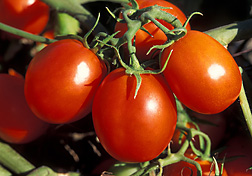
ARS is working on new uses for dried distiller's
grains (DDGs)–coproducts of corn ethanol production–such as being
used as an organic fertilizer on crops like tomatoes. Click the image for
more information about it.
|

|
ARS and Seed Company Examine Commercial Potential of
Ethanol Coproduct
By Jan Suszkiw
July 10, 2008 Studies by
Agricultural Research Service (ARS)
scientists have shown that dried distiller's grains (DDGs)—coproducts of
corn ethanol production—have potential as an organic fertilizer and for
weed control. But some ethanol producers are adopting new corn-grinding methods
that may affect the DDGs' usefulness.
To further study DDGs, ARS plant physiologist
Steve
Vaughn and colleagues entered into a one-year cooperative research and
development agreement (CRADA) with Summit
Seed, Inc., a Manteno, Ill.-based company specializing in turfgrass
production.
America's ethanol industry generates an estimated 10 million to 14 million
metric tons of DDGs annually from both wet and dry milling of corn, processes
that yield fermentable sugars for conversion into fuel alcohol. About 75
percent of the DDGs are fed to livestock. But since 2005, Vaughn has led a team
at the
ARS
National Center for Agricultural Utilization Research (NCAUR) in Peoria,
Ill., to develop new, value-added uses for DDGs.
In greenhouse and field studies, Vaughn showed that the DDGs can be used as
an organic fertilizer for tomatoes and other crops. Indeed, in 2007,
DDG-treated plots of Roma tomatoes yielded 226 total pounds of fruit, versus
149 pounds from untreated plants. And in turfgrass trials, the DDGs stopped
annual bluegrass and other weed seeds from germinating in stands of Kentucky
bluegrass.
But now, with more ethanol plants using dry-grinding methods, the DDGs, germ
and fiber fractions are generated before—rather than after—corn
sugars are fermented into ethanol. Determining how this new practice changes
the DDGs' biochemical and physical properties is a chief focus of ARS' CRADA
with Summit Seed.
Vaughn's ARS colleagues are
Jill
Winkler,
Kathy
Rennick,
Fred
Eller,
Mark
Berhow and
Brent
Tisserat—all with NCAUR in Peoria—and
Rick
Boydston and
Hal
Collins, both with ARS in Prosser, Wash.
ARS is a scientific research agency of the U.S. Department of Agriculture.